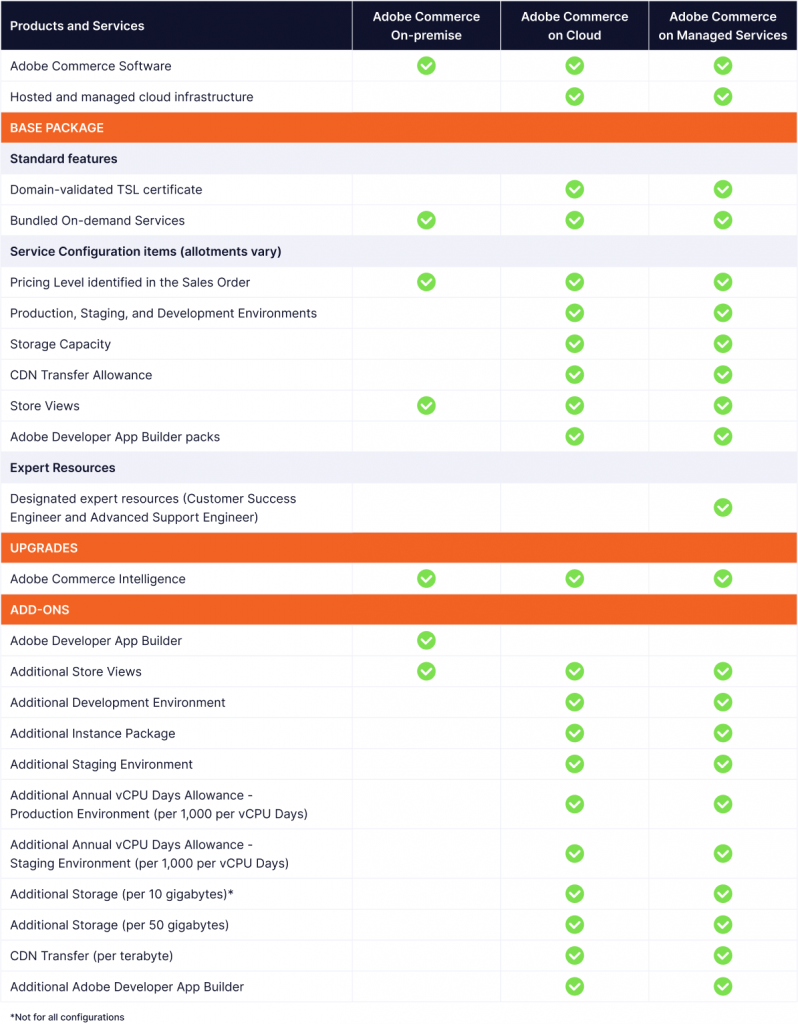Magento Enterprise is for businesses aiming for high performance and scalability. With a variety of advanced features, this platform facilitates growth and offers a solution well beyond the fundamental Magento Community. In our guide, we break down its key differentiators, from security to customizability, to help you determine if Magento Enterprise aligns with your business goals.
Key takeaways
- Magento Community is a cost-effective, open-source platform suitable for small-to-medium businesses needing customization, while Magento Enterprise is made for larger businesses requiring advanced features and higher traffic management.
- The choice between Magento Community and Enterprise should be based on budget, business size, growth potential, and desired features, with Magento Enterprise offering greater scalability, security features, and technical support at a higher cost.
- Both editions provide customization options and extensibility, but Magento Enterprise stands out with its performance, scalability, and advanced marketing tools, though users without official support can rely on a vibrant community for assistance.
Understanding Magento editions

Small-to-medium businesses often prefer Magento Community, the free version of the Magento platform. Its open-source nature allows for extensive customization, offering all your fundamental needs for building an eCommerce website. Store owners can take care of their online stores, adding third-party extensions to adjust the platform to their unique needs. Magento Community is indeed an adaptable platform that caters to those seeking cost-effective solutions without compromising on essential features.
Known as Adobe Commerce, the Magento Enterprise edition is perceived as the premium version of the Magento platform. It offers additional features and benefits compared to the standard version. Made for larger businesses and high-traffic websites, it offers a variety of advanced features beyond the capabilities of the Community edition. Its exclusive features, advanced tools, and ability to manage higher traffic volumes support the growing needs of large eCommerce sites. In essence, Magento Enterprise is a strong platform that meets the demands of enterprise-level businesses.
Magento Community Edition
The Magento Community Edition offers a variety of features for store owners, including:
- Mobile-friendly configuration
- Extensive reporting tools
- Product management
- Marketing tools
- Customer accounts
- Order management
- Catalog management
All of these features are designed to create a seamless online shopping experience.
Magento Community Edition is the go-to platform for small businesses and startups because of its flexibility and cost-effectiveness. Businesses can efficiently manage customer accounts and integrate multiple secure payment gateways, thanks to its adaptability. However, to make the most of its customization features, users will need a certain level of technical proficiency and resources for software installation and integration of Magento extensions.
In the end, while Magento Community Edition is a great tool in its own right, businesses must be prepared to invest time and expertise to unlock its full potential.
Magento Enterprise Edition
While Magento Community Edition is better for small to medium-sized businesses, Magento Enterprise Edition offers exclusive features such as:
- Full-page caching
- Optimized indexing
- Customer segmentation with targeted offerings
- Return management authorization
- Customer attribute management
- Content scheduling
- Widget and theme assignment to specific times
These features give you complete control over your customer’s shopping experience.
Owing to its design for scalability, performance, and security, Magento Enterprise Edition is a prime choice for large-scale eCommerce businesses. It offers:
- Advanced security features, including data encryption and secured payment bridges
- Regular delivery of security patches to ensure your online store is always protected
- Hosting alternatives such as Magento Commerce Cloud, which combines both the suite and cloud hosting
These features underscore its emphasis on scalability, flexibility, and dependable servers.
Choosing between Magento Community and Enterprise
Several factors come into play when making the crucial decision between Magento Community and Enterprise Edition. It’s not merely about picking the free version or the paid one; it’s about understanding your business needs, size, growth potential, and scalability requirements. Your choice should reflect the current state of your business and its future strategic direction.
When choosing between Magento Community and Magento Enterprise, it’s important to balance your possibilities with your needs. Here are some factors to consider:
- Budget: Magento Community Edition is a great option for small businesses on a tight budget, while Magento Enterprise Edition can be a significant investment.
- Growth: If your business is eyeing rapid growth or planning to handle high volumes of traffic, Magento Community Edition might not suffice.
- Advanced features: Magento Enterprise Edition offers advanced features that can be beneficial for larger businesses, but may be unnecessary for small businesses.
After considering these factors, you can make an informed decision about which version of Magento is best for your business.
Business size and growth potential
For larger businesses with an extensive product catalog and customer database, considering their size and growth potential, Magento Enterprise is a better fit. Its advanced features and support are made for high-volume operations and can accommodate your business’s growth seamlessly.
Magento Community Edition, in contrast, is best suited for small to medium-sized businesses due to its basic functionality requirements. This makes it an ideal choice for companies looking for a cost-effective solution. The free version of Magento provides a flexible yet powerful platform that can serve their eCommerce needs without overstretching their budget. However, for businesses planning to expand, it’s crucial to remember the potential constraints of Magento Community Edition, such as reduced performance on small or shared servers and the absence of official technical support.
Budget and pricing
Magento Community Edition is free to use, whereas Magento Enterprise Edition incurs a significant cost. The Enterprise Edition starts at $22,000 per year, a price that may seem steep for small businesses. The cost is contingent on the anticipated annual gross sales revenue, making it a significant investment.
The cost of Magento Enterprise Edition is not just about the licensing fee. It’s essential to factor in additional costs such as hosting, domain, and other related expenses. For small businesses generating less than $5 million in revenue, it’s very important to weigh the licensing costs against the potential benefits. If the advanced features of Magento Enterprise can significantly improve your eCommerce operations efficiency and profits, it might be worth the investment.
Security and compliance
When selecting an eCommerce platform, security and compliance are vital considerations. While the Magento Community Edition offers basic security features such as user authentication and authorization mechanisms, it lacks PCI compliance and features like credit card tokenization and secured payment bridges available in Magento Enterprise.
Magento Enterprise Edition offers enhanced security measures, including secured payment bridges, advanced data encryption, and regular security patches to ensure the safety of sensitive information. These features help businesses protect their customer data and minimize the risk of security breaches. It ensures a safe and secure shopping experience for customers and provides businesses with peace of mind. Magento Enterprise Edition may be the more suitable option for businesses prioritizing security.
In-depth comparison of features
A range of features catering to your eCommerce needs are offered by both Magento Community and Enterprise Editions. However, the two editions have distinct differences in their feature sets and capabilities. While they share core features, the Enterprise Edition steps up the game by offering more advanced and exclusive tools.
Magento Enterprise offers advanced customization capabilities, efficient return management, and a wide range of gifting options, among other features. On the other hand, Magento Community Edition is more limited in its capabilities but compensates with its flexibility and customization options. The choice between the two boils down to your business’s specific needs and requirements.

Customization and extensibility

Both Magento Community and Enterprise offer powerful customization options. Magento Enterprise Edition provides a more comprehensive set of tools, allowing for greater customization and a more seamless user experience. Features like visual merchandising and a What You See Is What You Get (WYSIWYG) page builder provide a higher level of customization, creating a more interactive and engaging shopping experience for customers.
In contrast, when comparing Magento Community Edition with Enterprise Edition, the Community Edition provides basic customization features, allowing for the creation and configuration of customizable options for products. While it may lack the advanced customization tools of the Enterprise Edition, the Magento Community’s strength lies in its flexibility. With the ability to integrate third-party plugins, businesses can expand the platform’s capabilities and adjust it to their specific needs.
Performance and scalability

Magento Enterprise Edition outperforms its Community counterpart in terms of performance and scalability. Here are some key features of Magento Enterprise Edition:
- Designed to meet the requirements of large eCommerce stores
- Offers improved scalability to accommodate extensive product catalogs
- Can handle larger customer databases
- Can handle high volumes of concurrent users
- Ensures optimal performance
On the other hand, while Magento Community Edition might be sufficient for small to medium-sized businesses, it may struggle to keep up with the demands of a high-traffic, large-scale eCommerce site. Therefore, for businesses anticipating rapid growth or planning to handle high volumes of traffic, Magento Enterprise Edition may be the better choice.
Marketing and customer engagement

Marketing and customer engagement tools are essential features of any eCommerce platform. Magento Enterprise Edition shines in this area, offering a more advanced range of capabilities. With features like intricate customer segmentation, businesses can target specific demographics with precise promotions and personalized content, enhancing customer engagement and boosting sales.
While Magento Community Edition offers basic SEO tools, its marketing capabilities can be expanded by integrating third-party plugins. This flexibility allows businesses to introduce advanced marketing functionalities to the platform, providing them with a cost-effective solution to enhance their marketing efforts.
Support and resources
In terms of support and resources, Magento Enterprise Edition users undoubtedly have the advantage. They receive official technical support from Adobe, which includes assistance with technical issues, guidance on platform usage, and access to dedicated customer service channels. This support can be invaluable, especially for businesses with limited technical expertise.
Magento Community Edition users, on the other hand, lack official technical support from Adobe. Instead, for assistance they rely on:
- Community forums
- Open-source communities
- Documentation
- Independent developers
While this may require more effort and time, it also fosters a vibrant and collaborative community of Magento users who share knowledge and resources to help each other succeed. This can also be solved by using Magento development services.
Take a moment to watch this comprehensive introduction, offering key insights that will enrich your understanding of the distinctions between Magento 2 Open Source and Adobe Commerce.
Real-life examples
Numerous businesses have found success using Magento Community Edition for eCommerce, creating a range of success stories. Various brands are using the potential of this free, open-source platform to establish thriving online stores. Through the adaptability and customizable features of Magento Community, these businesses have tailored their online presence to meet specific needs and preferences.
Similarly, Magento Enterprise Edition has been instrumental in the success of numerous large-scale eCommerce enterprises. Recognizable brands have capitalized on the advanced features and powerful capabilities of Magento Enterprise. By using its heightened scalability, performance, and security, these businesses have effectively managed extensive product catalogs, handled high traffic volumes, and ensured a secure shopping experience for their customers.
Companies like The Metropolitan Museum of Art, Lafayette 148, Macron, Rockar, and Puma are successfully using Magento-offered platform features. These recognizable brands have used these platforms to establish well-performing online stores tailored to their specific needs.
Summary
Both Magento Community and Enterprise Editions offer great features and capabilities for eCommerce businesses. The choice between the two largely depends on your specific business needs, size, growth potential, and budget. While Magento Community offers a cost-effective solution for small to medium-sized businesses, Magento Enterprise is more for the demands of larger, high-traffic businesses with its advanced features and superior performance. Regardless of the edition you choose, Magento remains a powerful and flexible platform that can drive your eCommerce success.
Frequently Asked Questions
What is Magento Enterprise Edition?
Magento Enterprise Edition is the paid version of Magento, offering advanced custom features and functionalities, such as promotional pricing for specific stores, categories, customer segments, products, and more.
What is the difference between Magento Commerce and Magento Enterprise?
Magento Enterprise Edition is the paid version of Magento and offers advanced custom features and functionalities compared to the community edition, including promotional pricing for specific stores, categories, customer segments, and products. The Enterprise Edition provides advanced marketing tools and more precise customer group targeting options, and both versions allow personalized promotions, pricing, and content. The cost for Magento Enterprise Edition starts from $22,000, depending on the annual gross revenue of the business.
How do I know if Magento is Community or Enterprise?
Magento is available in two editions: Community and Enterprise. You can check the edition of your Magento instance by logging into the admin panel and checking the version in the bottom right corner. The Enterprise Edition includes additional features and requires a license fee.
Are there any security differences between Magento Community and Enterprise Editions?
Magento Enterprise Edition provides enhanced security features and compliance options compared to Magento Community.
Ready to discover the features provided by Magento? Get in touch with us, and together we’ll find the best solution for your needs!



Share on: